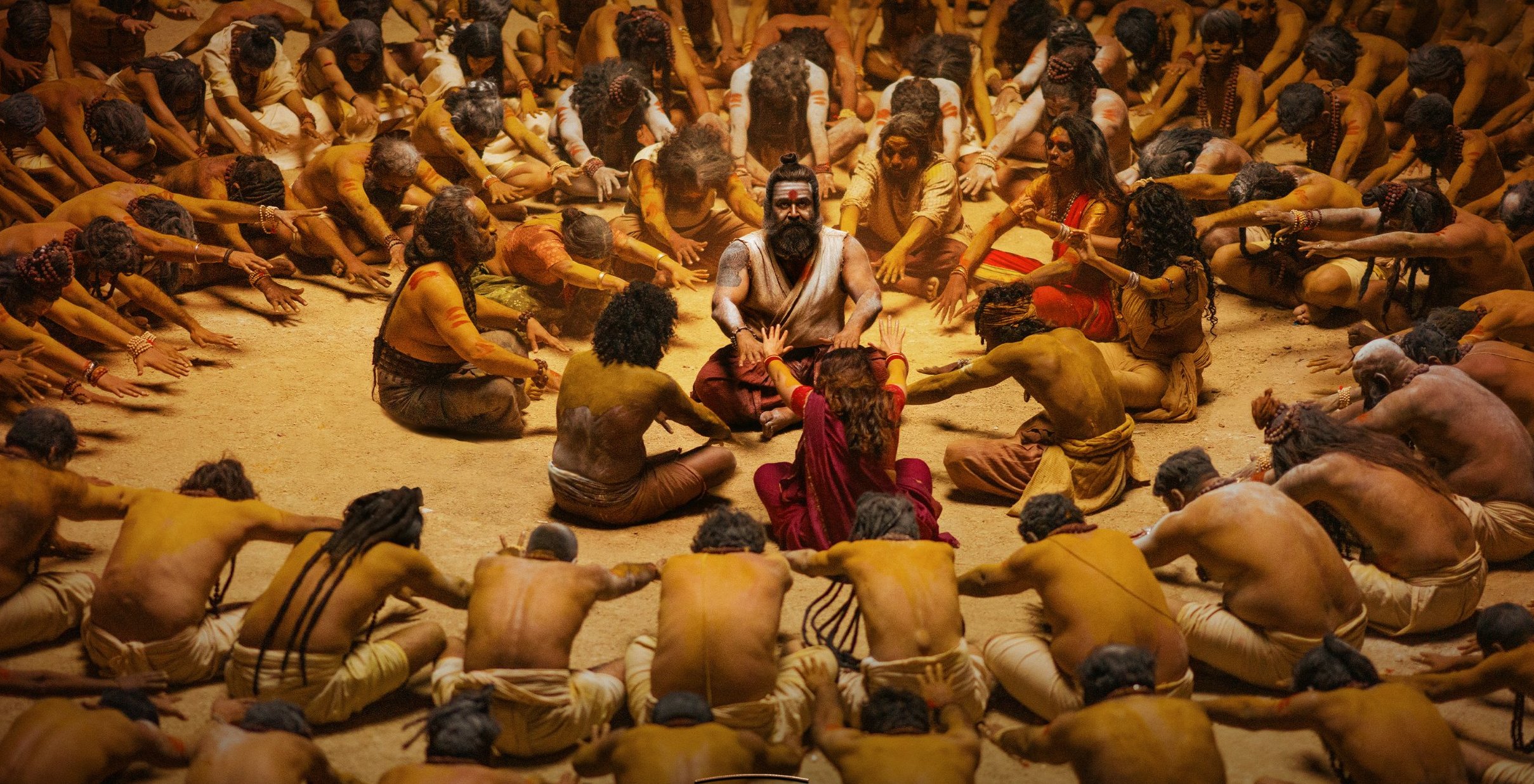It all started well in Malaikottai Vaaliban. The arid landscape, the aesthetic color palette, characters popping out of carefully crafted set pieces, and the striking background score, reminiscent of Ennio Morricone – it was evident Lijo Jose Pellissery had been watching too many spaghetti westerns. Pellissery, known for his breakout indie Angamaly Diaries, kept his inspirations intact as he introduced Mohanlal, who embodies Malaikottai Vaaliban, a mighty wrestler and wandering warrior. The film opens with a satisfying sequence. An ox cart slowly rumbles through the deserted landscape of a village. A young man walking along the ox cart announces with the same vigor as a wrestling announcer that the cart belongs to Malaikottai Vaaliban. Then, a chain of micro-events unfolds – a teenage boy running, a wrestler getting angry, his seductive wife laughing in his face, and people gluing up in an open field like in a Fevicol advertisement. As the commotion reaches its crescendo, Malaikottai Vaaliban enters, rickety like Captain Jack Sparrow, but when he unleashes himself, he radiates the swag of Brad Pitt’s Achilles in the Hollywood flick Troy. Even though this scene feels like a treat for the fans, it cleverly establishes the superhuman capabilities of Malaikottai Vaaliban. It also saves some explanations in the later part of the movie when Mohanlal does a couple of gravity-defying acrobatics.
However, after the first scene that sets the premise, Malaikottai Vaaliban makes a nose dive, and Lijo Jose Pellissery never being able to regain control. Malaikottai Vaaliban is the tale of a wrestler wandering through kingdoms. He is accompanied by his pretend dad, Ayyanar, and Ayyanar’s musician/acrobat son, Chinnappayyan. In every village, Malaikottai Vaaliban duals with the top wrestler. He defeats every one of them, rewrites the history stones, and often sleeps with the village belle before quietly bidding farewell. As he circles all the kingdoms and returns to the village where he started his journey, he faces a new enemy. The virtuous wrestler then joins the enslaved people to liberate their town.

The biggest stumbling block for Malaikottai Vaaliban is its weak screenplay. Mohanlal gave an earnest performance, but it was not good enough to rescue this wreck. Mohanlal is agile in action bits, ordinary in emotional moments, but a convincing choice for the larger-than-life wrestler the film demands. As the story progresses and Vaaliban continues his journey, new characters emerge. These stories, divided into episodes, are not connected. Sometimes, the stories felt stretched, and they served no purpose. Add the 155-minute run time to this equation, and Malaikottai Vaaliban is a dull sequence of random stories tied together. Then, there’s the bland dialog. As a historical fiction, it’s not easy to construct a new dialect for a region. Malayalam, a rigid language to work around, forced the writers to take the middle path. The result is not impressive. The dialogs sound cringy, over the top, and dramatic. Hareesh Peradi, known for his distinctive voice modulation, was the only exception. But he, too, was out of bounds when the film reached its forced climax, which only served as the flash news banner for the announcement of the sequel.
One of the flaws of Malaikottai Vaaliban is its inability to establish itself neither as a film of substance nor spectacle. It tried to weave an emotional layer with the romance between Chinnappayyan and Jamanthi. However, it barely scratches beyond the surface. Almost every character is one-dimensional and hardly engaging. Jokes didn’t land. Neither do the songs. However, one thing that worked was the action choreography in the first half. Mohanlal was effortless in delivering punches and doing acrobatics. But in the second half, when all the hell broke loose, action choreography ended up a farce. The only consolation is the visual-rich cinematography. Madhu Neelakandan successfully captured the mood of the landscape. In a last-minute twist, Lijo introduced an Othello-like storyline. He also took the risk to incorporate that element in the climax, and it fared poorly. Danish Sait was annoying as the archetype villain Chamathakan. Sonalee Kulkarni, Andrea Ravera, Diana Nasonova, and the rest of the characters in the castle episode were an absolute waste of time and talent.
Malaikottai Vaaliban, without any doubt, is the weakest film of Lijo Jose Pellissery. It conspicuously invested in imagery to forego depth and direction, a rare oversight from its auteur filmmaker.



